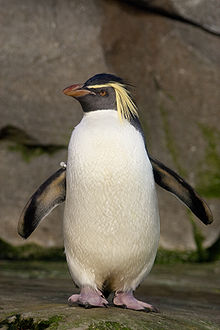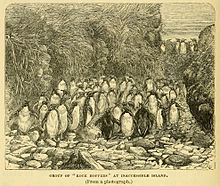- Northern Rockhopper Penguin
-
Northern Rockhopper Penguin 
At Berlin Zoological Garden, Germany Conservation status Scientific classification Kingdom: Animalia Phylum: Chordata Class: Aves Order: Sphenisciformes Family: Spheniscidae Genus: Eudyptes Species: E. moseleyi Binomial name Eudyptes moseleyi
Mathews & Iredale, 1921The Northern Rockhopper Penguin, Eudyptes c. moseleyi, is usually considered a subspecies of rockhopper penguin, although fairly recent studies show evidence of distinction from the Southern Rockhopper Penguin group Eudyptes c. chrysocome/E. c. filholi.
A study published in 2009 showed that the world population of the Northern Rockhopper had declined by 90% since the 1950s. For this reason, the Northern Rockhopper Penguin is classified as an endangered.
Contents
Taxonomy
The Rockhopper Penguin Eudyptes chrysocome is sometimes considered two species, Northern and Southern Rockhopper Penguin, after research published in 2006 demonstrated morphological, vocal and genetic differences between the two populations.[2][3] Molecular datings suggest that the genetic divergence with the Southern Rockhopper penguin may have been caused by a vicariant event caused by a shift in the position of the Subtropical Front during the mid-Pleistocene climate transition.[4] Analysis of a part of a mitochondrial control region from a Northern Rockhopper Penguin found on the Kerguelen Islands showed that it may have come from Gough Island, 6,000 km away, and that the Southern and Northern Rockhoppers are genetically separate, though some individuals may disperse from their breeding colonies.[5] Many taxonomists have yet to recognize the split, although some are beginning to do so.
Distribution and habitat
More than 99% of Northern Rockhoppers breed on Tristan da Cunha and Gough Island in the south Atlantic Ocean.[1]
Ecology and behaviour
Food and feeding
The Northern Rockhopper Penguin feeds on krill and other things such as crustaceans, squid, octopus and fish.[1]
Breeding
It breeds in colonies in a range of locations from sea level or on cliff sides, to sometimes inland.[1]
Population and threats
 Northern Rockhopper Penguins on Inaccessible Island, drawn by the naturalist aboard HMS Challenger
Northern Rockhopper Penguins on Inaccessible Island, drawn by the naturalist aboard HMS Challenger
The current population is estimated to be between 100,000-499,999 breeding pairs at Gough Island, 18,000 to 27,000 pairs at Inaccessible Island, and 3,200 to 4,500 at Tristan da Cunha. In the Indian Ocean, the population was 25,500 pairs on Amsterdam Island, and 9,000 pairs on St Paul Island in 1993; there has been no information available on population trends there since the 1990s. Declines at the Atlantic Ocean sites show a decline of 2.7 per cent per year;[1] the drop in the population at Gough Island has been described as equivalent to the loss of 100 birds every day since the 1950s.[6]
A study published in 2009 showed that the world population of the Northern Rockhopper had declined by 90% since the 1950s, possibly because of climate change, changes in marine ecosystems and overfishing for squid and octopus by humans.[7] Other possible factors in the decline include disturbance and pollution from ecotourism and fishing, egg-harvesting, predation from introduced House Mice Mus musculus and predation and competition from Subantarctic Fur Seals Arctocephalus tropicalis.[1]
The Northern Rockhopper Penguin is classified as Endangered because of the decline in numbers over the last three generations (or 30 years).[1]
2011 oil spill
On March 16, 2011, the Maltese-registered freighter MS Oliva ran aground on Nightingale Island, spilling tons of heavy crude into the ocean. The crew was rescued, but the ship broke up, leaving an oil slick that surrounded the island, threatening its population of rockhopper penguins.[8][9] Nightingale Island has no fresh water, so the penguins are being transported to Tristan da Cunha for cleaning.[10]
References
- ^ a b c d e f g BirdLife International (2008) Species factsheet: Eudyptes moseleyi. Retrieved 16 January 2009.
- ^ Jouventin P., Cuthbert R.J., Ottvall R. (2006). Genetic isolation and divergence in sexual traits: evidence for the Northern Rockhopper Penguin Eudyptes moseleyi being a sibling species. Molecular Ecology 15:3413-3423.
- ^ Banks J., Van Buren A., Cherel Y., Whitfield J.B. (2006). Genetic evidence for three species of Rockhopper Penguins, Eudyptes chrysocome. Polar Biology 30:61-67.
- ^ de Dinechin, M., Ottvall R., Quillfeldt P. & Jouventin P. (2009). Speciation chronology of northern rockhopper penguins inferred from molecular, geological and palaeoceanographic data. Journal of Biogeography 36(4):693–702.
- ^ de Dinechin M., Pincemy G., Jouventin P. (2007) A northern rockhopper penguin unveils dispersion pathways in the Southern Ocean Polar Biology. 31(1):113-115
- ^ msnbc.com. Northern rockhopper penguins near extinction. 16 January 2009. Retrieved 18 March 2009.
- ^ BirdLife International. Penguins are walking an increasingly rocky road. 16 January 2009. Retrieved 16 January 2009.
- ^ "MS Oliva runs aground on Nightingale Island". The Tristan da Cunha Website. http://www.tristandc.com/newsmsoliva.php. Retrieved 23 March 2011.
- ^ "Oil Spill Menaces Penguins". Science 331: 1499. 25 March 2011. doi:10.1126/science.331.6024.1499-b.
- ^ BBC News Oil-soaked rockhopper penguins in rehabilitation
External links
Penguins (order: Sphenisciformes • family: Spheniscidae • subfamily: Spheniscinae) Genus Aptenodytes (great penguins) Pygoscelis (brush-tailed penguins) Eudyptula (little penguins) Little Penguin (or Little Blue Penguin) • White-flippered Penguin (or Northern Little Penguin)Spheniscus (banded penguins) Megadyptes Yellow-eyed Penguin • Waitaha Penguin (extinct)Eudyptes (crested penguins) Fiordland Penguin • Snares Penguin • Erect-crested Penguin • Southern Rockhopper Penguin • Northern Rockhopper Penguin • Royal Penguin • Macaroni Penguin • Chatham Islands Penguin (extinct)Categories:- IUCN Red List endangered species
- Eudyptes
- Penguins
- Flightless birds
- Fauna of Tristan da Cunha
- Fauna of Gough Island
- Animals described in 1921
Wikimedia Foundation. 2010.

